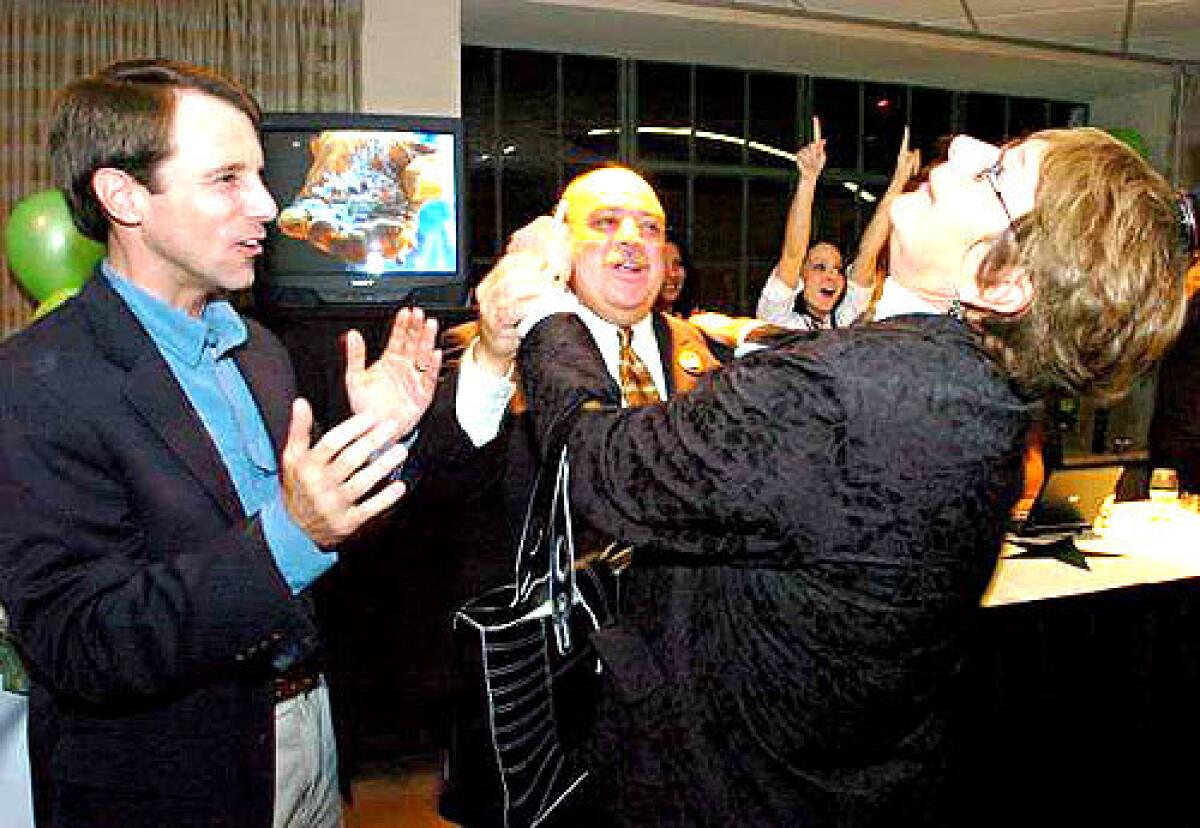Plan for Guardians Outlined

- Share via
Calling for reform of California’s “broken” conservatorship system, a leading lawmaker outlined an ambitious plan Monday for licensing and auditing professional guardians who care for the state’s most vulnerable adults.
Assemblyman Dave Jones (D-Sacramento), chairman of the Judiciary Committee, said he would introduce a bill next month that would require training and licensure for conservators. It would also create a state ombudsman to investigate complaints and give courts more resources to conduct spot audits of conservators’ work.
The proposal is the most far-reaching of several advanced in recent weeks by state lawmakers. It won the preliminary backing of California’s chief justice, Ronald M. George, who said that more money is urgently needed to help the courts monitor conservators.
“I don’t think it’s appropriate to sit back and take a long-term view,” George said. “There are some things that need to be addressed right away.”
Jones unveiled his plan after four hours of testimony at a special joint hearing in Los Angeles of the Assembly and Senate judiciary committees. The hearing was called to investigate abuses by conservators highlighted in a four-part series in The Times last month and included testimony from those who said they had been victimized by professional guardians.
Conservators control the care and finances of adults, usually seniors, who the probate courts have determined are incapable of caring for themselves or managing their own finances.
The Times investigation found that professional conservators were often able to gain control over the lives and finances of elderly adults in court without their knowledge or consent. Some conservators neglected their wards, isolated them from relatives and ran up fees. Overwhelmed probate courts, which appoint conservators and monitor their services, overlooked incompetence, neglect and outright theft.
“It’s certainly unconscionable that these horrendous abuses have been able to occur for so long,” said Jones, a former legal aid attorney who spent much of his career helping seniors with their legal problems. “I don’t think it’s enough to use Band-Aid fixes for a system that’s broken. I don’t think that we have a year to wait for reforms.”
The Judicial Council of California, which sets policy for courts statewide, is setting up a task force to study laws on conservatorship and review training received by judges and their staffs. As the council also gathers data on the number of people under conservatorship, George said he will ask the panel to look closely at Jones’ plan.
Such reform measures are likely to face hurdles in Sacramento, where state legislators and governors are traditionally wary of adding regulation to emerging professions. Since 1988, three attempts to license professional conservators have failed. Recent budget woes have made it harder to fund new initiatives. Nevertheless, some observers said that Jones’ reforms could succeed after recent publicity about abuses, given his influence as chairman of the Judiciary Committee.
If Jones’ plan does not cost a huge amount of money, “it’s one that’s likely to get through,” said Barbara O’Connor, director of the Institute for the Study of Politics and Media at Cal State Sacramento. “Dave has a good amount of clout.”
Jean Ross, executive director of the California Budget Project, a nonprofit policy research group that studies the state budget, said that the issue of disabled seniors being neglected or mistreated will probably touch a nerve that elevates it beyond party rivalries.
“I would think this would be an area where if the cost is modest, you would find bipartisan interest because it is one of those there-but-for-the-grace-of-God-go-I types of issues,” Ross said. “This could be my mother, this could be my aunt, this could be somebody who I know.”
Nearly two dozen people testified Monday at the Ronald Reagan State Office Building in downtown Los Angeles.
Gerardine Brown, a state parole officer, cried as she recounted how a conservator took over her mother’s life and assets in 2000 without their permission. The case cost her family about $30,000 and made the months before her mother’s death all the more painful, she said.
“She was just an invisible whisper that was swept away in this process,” Brown said. “Parolees have a better day in court, and they’re felons.”
Superior Court Judge Aviva Bobb, who supervises Los Angeles County’s probate courts, complained that judges have neither the time nor the resources to adequately scrutinize the conservators they appoint.
In Los Angeles, the court recently hired three new investigators, but still has just 13 to handle more than 6,000 active cases. Each must visit four people under conservatorship a day.
In addition, she said, courts lack the expertise and the time to ensure conservators file accurate reports on how they spend their clients’ money.
“We have to assume the correctness of accountings,” she said. “Even beyond auditing what is in front of us, we can’t go out and look at people’s books. There just is no staff.”
Bobb cautioned lawmakers against rushing reforms, asking them to wait until the Judicial Council’s task force had time to determine what changes are needed.
“We have to slow down while this issue is burning,” she said. “If we respond too quickly, we’re apt to make some mistakes that could take a long time to rectify.”
But Jones said some reform needed to start now. He said his legislation would add funding for the courts and county public guardian offices and involve two executive departments of state government. It would require:
Licensing through the Department of Consumer Affairs, which could revoke the licenses of conservators who breached its standards. Jones also proposes initial and ongoing training of professional conservators.
Creation of a new state Office of Ombudsman within the Department of Aging, which would investigate alleged abuses by conservators. Currently, those with complaints usually must hire attorneys and file court papers spelling out their grievances, a process that can be slow and costly. The ombudsman’s office “will be a place that family and friends can turn to for help for their loved ones,” Jones said.
Random auditing of conservators by the courts, much like those conducted by the Internal Revenue Service, to ensure that their accountings are honest. Conservators would also have to file receipts and bank statements as part of the financial reports showing how they spend their clients’ money.
Increased numbers of probate court investigators to visit people under conservatorship. Some counties, including Los Angeles and San Diego, have fallen behind in visiting seniors a year after a conservator is appointed and then every two years thereafter. The bill also would increase resources for other court staff who review conservators’ financial reports.
Increased funding for county public guardian officesthat act as conservators of last resort for the indigent but have been chronically underfunded.
The Professional Fiduciary Assn. of California, the industry trade group for professional conservators, applauded portions of Jones’ plan.
“We’re really behind the licensing,” said Sally Graham, a professional conservator in Huntington Beach who chairs the association’s legislative committee. “We’ve been working on it for 10 years.”
Graham said the association planned to review other parts of Jones’ proposal and draft a formal response.
More to Read
Sign up for Essential California
The most important California stories and recommendations in your inbox every morning.
You may occasionally receive promotional content from the Los Angeles Times.














